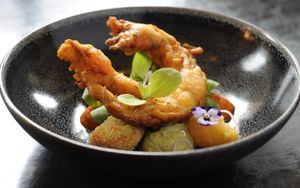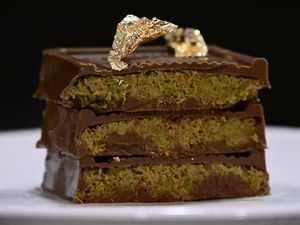Food review: Lasan, Birmingham
For a taste of India in a cool and cultured restaurant there’s only one place to go. Andy Richardson enjoys food made with real passion. . .

The Millennium marked a turning point in the fortunes of Britain’s Second City. Once derided as the place that produced Bird’s Custard Powder, fried pork rinds and very little else, its star began to rise.
Andreas Antona, at Simpsons, and Glynn Purnell, first at Jessica’s and then at Purnell’s, spearheaded a new wave of fine dining restaurants. The city, once synonymous with Typhoo Tea, HP Sauce, Cadbury’s chocolate and faggots and peas gradually became better known for being a centre of gastronomic excellence.
As more exceptional chefs moved to the city, its reputation started to grow. It replaced Ludlow as being the most important gastronomic town or city outside London. More restaurants were awarded Michelin stars – the city presently has five – and diverse foods from around the world – 27 countries at the last count – were represented in city restaurants.
And while Simpsons and Glynn Purnell have been the two ever-present features of Birmingham’s dining scene, another man has also played a hugely important part in catapulting his home city to the top of the food charts.
Aktar Islam was born and brought up in Birmingham. His father, who moved to the city from Bangladesh shortly before Aktar was born, was a political scientist who opened an Indian restaurant in Solihull, called The Indian Place.
Aktar grew up surrounded by food and started helping his mother to cook at the age of seven. By the age of 13, he was working in his father’s restaurant and at 16 went full time. His culinary skills and business nous were apparent from the start and at the age of 22 he co-founded Lasan in St Paul’s Square, in Birmingham’s Jewellery Quarter, where he remains head chef and director.
Lasan is no ordinary Indian restaurant. There are more similarities between Simpsons and Purnell’s than there are with a standard, neighbourhood Indian restaurant. For Lasan is all about refinement and intoxicating flavour, rather than the over-cooked, over-spiced and underwhelming stews that habitually feature at restaurants of lower quality.
Though a Michelin star has thus far eluded the restaurateur, his food is listed in that guide and has won plaudits from the UK’s most feared critics. Gordon Ramsay named Lasan the Best Local Indian Restaurant in the UK on Channel 4’s The F Word, Aktar won the fish course in the final of the 2011 BBC Two series of Great British Menu and he has appeared on numerous TV shows, from Market Kitchen and Saturday Kitchen to The One Show. He is a regular at the BBC Good Food Shows, Taste Festivals and more, while his inclusion on The Sunday Times list of Britain’s Top 100 Restaurants has been hard earned.
His links with the city’s highest ranked chefs are also in good stead – earlier this year he launched a one-night takeover of Simpsons. It was a sell-out, with numerous Michelin-starred chefs among his guests.
His reputation extends to all quarters: he was invited by Queen Elizabeth II and Prince Philip to a Buckingham Palace reception for his contribution to the British hospitality industry.
Starry
Such a starry CV doesn’t come from simply being a nice guy, however. And the cornerstone of Aktar’s career has been his ability to capture the flavours of true India in colourful and diverse plates of food. Cooking with passion and flair, he has created exotic dishes that have dazzled and wowed his customers.
Lasan is unlike any other Indian restaurant in the West Midlands. Cool and cultured, built on a passion for reinvention, it has more in common with such world class London restaurants as Quilon, Benares, The Cinnamon Club and Tamarind than it does with a neighbourhood balti house.
The décor is understated, with neutral colours, plain wooden tables and a small number of Indian statues offering a touch of class. Service is an exceptional. A long-serving restaurant manager provides a warm welcome for guests, offering assured, confident service in the most efficient and punctilious manner. His staff also work hard, unobtrusively engaging with guests to charge glasses, explain menus and generate the warmest atmosphere.
And yet the stand-out quality of Lasan is unquestionably Aktar’s food. Simultaneously subtle and exciting, imaginative and intelligent, it redefines Indian cuisine for the 21st century. There is serious skill and panache on every plate. Small tamarind water-filled crackers began my midweek dinner; providing a heady mix of big, bold, sweet-but-tart flavour and complementary texture. Posh poppadoms were served with three homemade dips, a cooling yoghurt variety, spicy mango and smooth and sweet tomato.
And then it was onto the main attractions.
My starter was a dish inspired by Aktar’s winning fish course on BBC’s Great British Mango. Konkan Kekada featured a soft shell crab in crispy ajwain and Kashmiri chilli batter, with three small Devonshire crab cakes, south Indian tomato chutney and sour, raw mango. It was heavenly. A small, leafy salad provided a calming presence while the combination of sweet, crunchy, slightly-hot crab and sour mango was ring-a-ding-ding brilliant. Light and playful, flavoursome and exhilarating, the dish was an eye-popping introduction to an inspiring and stimulating evening.
My main was equally good: the sort of stylish and sensibly proportioned dish that might be found at a Michelin star restaurant – but loaded with heady spice. Venison sourced from HRH Balmoral & Highland Estate was featured as a spiced loin and slow braised shoulder. Perfectly cooked, scented cabbage, a viscous, spicy sauce and a round, crisp, cigar-shaped samosa-esque adornment completed the dish. It was marvellous. The loin was tender and exquisite, the samosa ingenious and the shoulder utterly gorgeous. The sauce was a work of beauty while a side of fluffy-as-a-cloud pilau rice, cooked in lamb stock, added body and depth.
Dessert was magnificent. The kaffir lime leaf posset with raspberry sorbet and raspberry shortbread won a close-run race with the chai panna cotta. It proved a good decision. The posset was indulgent but just the right side of light. The kaffir was sharp and citrusy, dreamy and sweet. The biscuit and sorbet provided complementary tastes and textures. As with the courses that preceded it, it was smart, intelligent, on-point cooking that brought the curtain down on a pyrotechnic evening of gastronomic thrills.
Aktar Islam is one of Birmingham’s greatest home-grown talents. A masterful chef, a stylish epicure and a nationally-renowned connoisseur, his breathtaking food is compelling. For 15 years, he’s been ahead of every Southern Asian chef in the region. Gordon Ramsay and the judges on BBC’s Great British Menu know a thing or two about food. They rate him as the best of the best – and who are we to argue.




